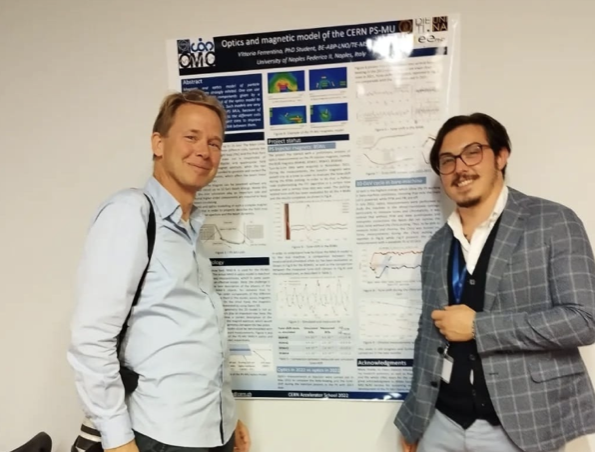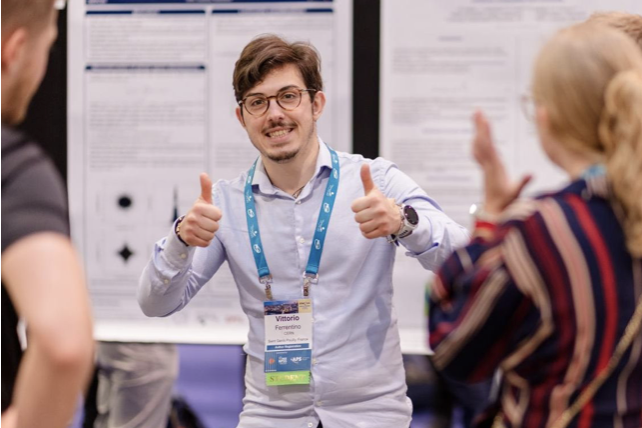His learning journey at CERN has been anything but linear—starting with superconducting magnet technology and quench phenomena before shifting towards beam dynamics parameters. However, one constant throughout this path has been the CERN Accelerator School (CAS), which played a pivotal role in expanding his knowledge and network within the field.
Vittorio’s first major step was the Introductory CAS course 2022 in Kaunas, Lithuania. “It was one of the most beautiful experiences of my life,” he recalls. More than just an academic milestone, CAS became the foundation of his professional network. He met colleagues working in similar research areas, formed friendships that continue to this day, and discovered that scientific collaboration often begins over coffee breaks and late-night discussions.
Following the Introductory CAS, Vittorio attended JUAS courses—an intensive three-month-long experience—before eventually joining the Advanced CAS in Spa, Belgium, in 2024. This progression helped him build a strong foundation before tackling the more complex topics covered in the advanced sessions, such as electron clouds, wakefields, and nonlinear effects. “At that stage, after two or three years at CERN, you’re mature enough to grasp these advanced concepts truly.” On the other hand, with the perspective of time, I think the Introductory course would have been a better fit after my JUAS experience, helping me to deepen and consolidate all knowledge and introducing me new concepts on accelerator science that JUAS does not cover.
The lecturers were incredibly approachable and willing to explain complex topics in a way that made sense. I even stayed in touch with some of them afterwards, visiting their offices at CERN for advice.
Beyond academics, CAS offered something unexpected—exposure to different cultures. “CAS happens in different countries, and the excursion days allow you to discover places you wouldn’t normally visit. It’s a great cultural experience.”
One of the most valuable aspects of CAS, Vittorio found, was the opportunity to interact closely with lecturers. Engaging in discussions during coffee breaks and free time allowed him to ask more complex questions, gain new insights, and refine his research approach. “The lecturers were incredibly approachable and willing to explain complex topics in a way that made sense. I even stayed in touch with some of them afterwards, visiting their offices at CERN for advice.” These interactions highlight the importance of mentorship and accessibility in academic growth.
Everyone, especially newcomers, should join CAS. It changes the way you see things. If you start a PhD, there’s life before CAS and life after CAS.

Another key academic asset Vittorio highlights is the CAS proceedings, which serve as an invaluable reference throughout one’s career. “The introductory proceedings were excellent—I even referenced them during my PhD. They are well-structured, and the lecturers follow them closely during the lectures. The availability of recordings also allows for revisiting complex topics at one’s own pace.” This comprehensive documentation ensures that the knowledge gained at CAS remains accessible long after the courses have ended.
Now, after finishing his PhD, Vittorio reflects on how CAS has influenced not just his research but his entire approach to the field. “Everyone, especially newcomers, should join CAS. It changes the way you see things. If you start a PhD, there’s life before CAS and life after CAS.”
His advice to future participants? “If you’re tired after the first week, that’s nothing—The best is yet to come.” With plans to attend more topical courses in the future, Vittorio continues to embrace the learning, connections, and inspiration that CAS provides, knowing that each new course will open doors to fresh discoveries.

